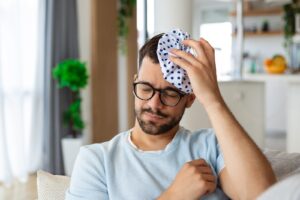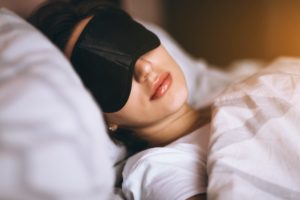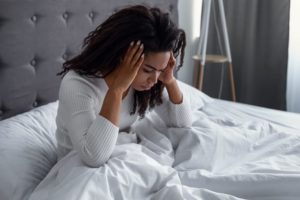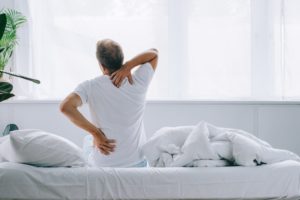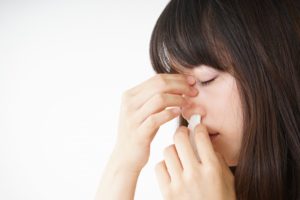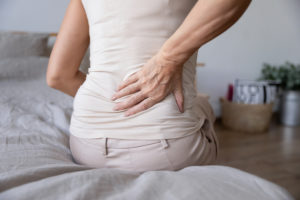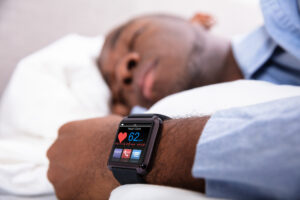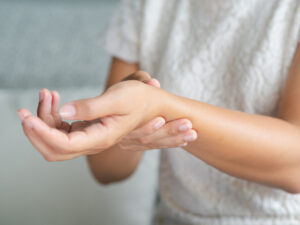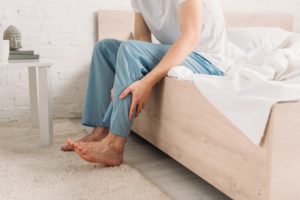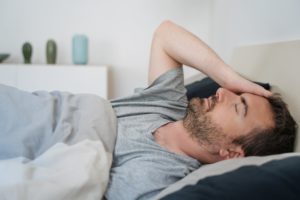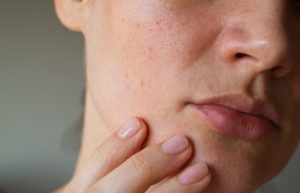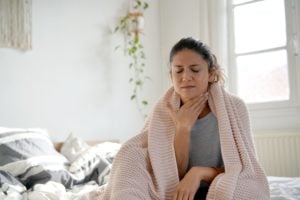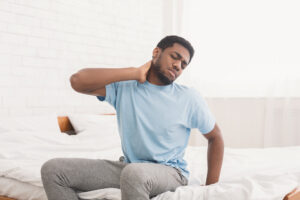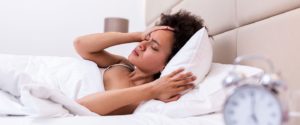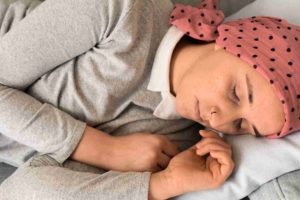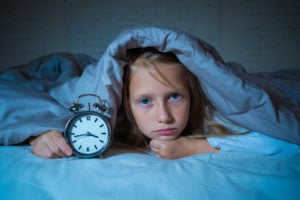How to Sleep With a Sore Throat
The pain accompanying a sore throat can make it challenging to get a good night’s sleep. However, doing a few things to reduce throat pain, like gargling with salt water or drinking a warm beverage, may lead to more comfortable rest. We discuss strategies to reduce pain and promote sleep while experiencing a sore throat.
Run a Humidifier at Night
A sore throat can worsen at night if the air in the bedroom is dry. Keeping the room environment humid counteracts air dryness by moistening the air, which may relieve some throat pain .
Ideal indoor humidity is 30% to 50% , which can be measured using a humidity gauge. If a room’s humidity falls below this level, a cool-mist humidifier can help regulate it. A humidifier can add moisture to the air as a person sleeps, potentially reducing unnecessary throat irritation. It is important to clean a humidifier regularly to limit mold and bacteria growth and spread.
If a humidifier is not available, running a warm shower instead may help. The steam from the shower mimics a humidifier’s steam release and may help a person’s throat feel better as they prepare to sleep. Experts recommend closing the bathroom door to keep the shower steam inside as a person breathes it in and out for several minutes to get the benefits.
Are You Getting Enough Deep Sleep?
A variety of issues can cause degrade your sleep quality. Answer three questions to understand if it’s a concern you should worry about.
Gargle Salt Water
No direct evidence suggests that gargling with salt water helps reduce throat pain. However, some people find that doing so offers relief from their sore throat . People can make a salt water gargle at home by combining one-quarter to half of a teaspoon of salt with an 8-ounce cup of warm water. This mixture can then be sipped, gargled in the throat for a few seconds, and spit out before lying down for the night.
If gargling salt water does not improve symptoms, a doctor might prescribe a gargle that can temporarily numb the throat to reduce pain during sleep. However, first the doctor may ask what other symptoms are present, if any, to determine whether this type of prescription might help the sore throat.
Take Over-the-Counter Pain Medication
Pain medications may relieve some of the pain of a sore throat, which could help with sleep if pain is interfering. Over-the-counter pain medications, like aspirin, acetaminophen, and ibuprofen, may all effectively reduce throat pain. Pain medication can take anywhere from one to six hours to work, so it should be taken early enough to have time to take effect before sleep.
People should check with their doctor before taking over-the-counter pain medication for a sore throat, as these medications may make some health conditions worse or interact with other medications. Also, some cold medicines marketed for a sore throat may already contain acetaminophen, making additional dosages potentially dangerous .
When over-the-counter pain medication is safe for an individual to use, experts generally recommend taking the lowest dosage to help a sore throat.

Try Throat Sprays or Lozenges
Throat sprays and lozenges can soothe a sore throat relatively quickly compared to taking pain medication. Since sprays and lozenges work more quickly, they may be helpful for people who need rapid relief right before they go to sleep.
Throat sprays may kill germs, contain pain-relieving medications that numb the throat, and reduce throat pain. Lozenges also reduce throat pain by numbing the throat with ingredients like menthol or dyclonine. Both products are widely available as over-the-counter medications.
Unfortunately, the soothing effects of throat sprays and lozenges may not last as long as effects of over-the-counter pain medications. However, a person who wakes up during the night with throat pain may be able to use more throat spray or suck on another lozenge before falling back to sleep. The printed instructions that come with the product should explain how frequently the spray or lozenges can be used.
Consume Warm or Cold Liquids
Warm liquids may soothe a sore throat. For example, a person may want to drink plain broth or a warm cup of tea before bed to receive relief. Adding honey to tea can also help by coating the throat, which may provide additional pain relief. Some research also suggests that certain types of herbal teas, like those containing licorice root, marshmallow root, or elm inner bark, may reduce throat pain.
Alternatively, cold liquids or cold, soft foods may provide relief to some people. Ice cream or frozen yogurt are a way to consume calories during a time when eating may feel difficult, and numb the throat for a temporary soothing effect. Similarly, sucking on a popsicle or ice chips before bed may help.
Stay Hydrated Throughout the Day
Having a sore throat can make swallowing painful, which may deter a person from drinking enough fluids . If a sore throat is caused by an illness with other symptoms, like fever, vomiting, or diarrhea, those symptoms may contribute to a loss of necessary fluids. Dehydration may occur when a person loses fluids or does not take in enough fluid. Dry mouth, a common side effect of dehydration, can lead to throat dryness, potentially causing more discomfort.
Generally, most adults should get at least 11 to 16 cups of water from food and drinks each day. How many glasses of water a person needs to drink varies, depending on their age, size, and how much fluid they receive from their foods. If drinking with a sore throat feels difficult, sucking on ice chips or popsicles can help you stay hydrated throughout the day and calm throat pain.
Sleep With Your Head Elevated
Elevating the head while sleeping may help relieve congestion that contributes to throat pain from excess mucus drainage. When lying down, nasal congestion may become worse, primarily because of changes in blood flow that affect vein size and pressure within the blood vessels of the sinuses and neck.
Sleepers with a sore throat from postnasal drip can try using a wedge pillow to keep the head elevated while sleeping to prevent congestion that may occur when lying on one’s back.
“Sore throat is a common ailment that can interfere with sleep. It is important to look for a cause as it helps reach a remedy quickly.”
Dr. Abhinav Singh, Sleep Physician
How Getting Good Sleep Can Help You Feel Better
Since falling short on sleep has been found to weaken the immune system , getting good sleep could help you recover from any illness associated with your sore throat. Sore throats can be caused by bacterial infections, but viral infections are more likely to cause them. While antibiotics may help a bacterial infection, they cannot treat sore throats caused by viral infections.
Not getting enough sleep can make it more difficult for your immune system to fight a virus associated with a sore throat. If you have trouble getting enough sleep, improving your sleeping habits — a process also known as sleep hygiene — may help. Try going to bed and waking at consistent times each day and doing a relaxing activity before bed. Also, keep your room cool and avoid using electronics near bedtime. If you want to take a nap, try to take one earlier in the day to avoid sleep disruptions at night.
Medical Disclaimer: The content on this page should not be taken as medical advice or used as a recommendation for any specific treatment or medication. Always consult your doctor before taking a new medication or changing your current treatment.

Still have questions? Ask our community!
Join our Sleep Care Community — a trusted hub of sleep health professionals, product specialists, and people just like you. Whether you need expert sleep advice for your insomnia or you’re searching for the perfect mattress, we’ve got you covered. Get personalized guidance from the experts who know sleep best.
References
12 Sources
-
UpToDate. (n.d.). Patient education: Sore throat in adults (The basics). UpToDate., Retrieved June 6, 2023, from
https://www.uptodate.com/contents/sore-throat-in-adults-the-basics -
U.S. Environmental Protection Agency. (2022, September 14). Care for your air: A guide to indoor air quality., Retrieved June 6, 2023, from
https://www.epa.gov/indoor-air-quality-iaq/care-your-air-guide-indoor-air-quality -
Stead, W. (2021, March 22). Symptomatic treatment of acute pharyngitis in adults. In M.D. Aronson (Ed.). UpToDate., Retrieved June 6, 2023, from
https://www.uptodate.com/contents/symptomatic-treatment-of-acute-pharyngitis-in-adults -
Centers for Disease Control and Prevention. (2009, December 5). Caring for someone sick at home: Treat other flu symptoms., Retrieved June 6, 2023, from
https://www.cdc.gov/h1n1flu/homecare/treatsymptoms.htm -
Stead, W. (2021, June 11). Patient education: Sore throat in adults (Beyond the basics). In M.D. Aronson (Ed.). UpToDate., Retrieved June 6, 2023, from
https://www.uptodate.com/contents/sore-throat-in-adults-beyond-the-basics -
AHFS Patient Medication Information. (2017, September 15). Lidocaine viscous. American Society of Health-System Pharmacists, Inc., Retrieved June 6, 2023, from
https://medlineplus.gov/druginfo/meds/a682701.html -
Lynch, S. S. (2022, July). Drug interactions. Merck Manual Consumer Version., Retrieved June 6, 2023, from
https://www.merckmanuals.com/home/drugs/factors-affecting-response-to-drugs/drug-interactions -
A.D.A.M. Medical Encyclopedia. (2021, August 10). Dehydration. MedlinePlus., Retrieved June 6, 2023, from
https://medlineplus.gov/ency/article/000982.htm -
A.D.A.M. Medical Encyclopedia. (2021, October 10). Water in diet. MedlinePlus., Retrieved June 6, 2023, from
https://medlineplus.gov/ency/article/002471.htm -
A.D.A.M. Medical Encyclopedia. (2021, July 19). Stuffy or runny nose – Adult. MedlinePlus., Retrieved June 6, 2023, from
https://medlineplus.gov/ency/article/003049.htm -
Naclerio, R. M., Bachert, C., & Baraniuk, J. N. (2010). Pathophysiology of nasal congestion. International Journal of General Medicine, 3, 47–57.
https://pubmed.ncbi.nlm.nih.gov/20463823/ -
Cirelli, C. (2022, October 10). Insufficient sleep: Definition, epidemiology, and adverse outcomes. In R. Benca (Ed.). UpToDate., Retrieved June 6, 2023, from
https://www.uptodate.com/contents/insufficient-sleep-definition-epidemiology-and-adverse-outcomes


